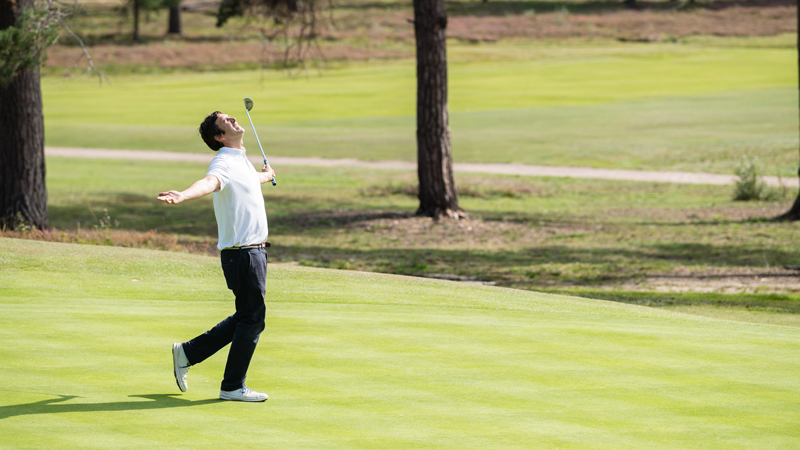How To Manage Your Golfing Expectations On Returning To The Game
It's important to be realistic and be prepared to ease back in


Subscribe to the Golf Monthly newsletter to stay up to date with all the latest tour news, equipment news, reviews, head-to-heads and buyer’s guides from our team of experienced experts.
You are now subscribed
Your newsletter sign-up was successful
Want to add more newsletters?
As we anticipate a return to the fairways, we need to be realistic about what we’re going to experience and achieve. Here’s some guidance on managing expectations.
How To Manage Your Golfing Expectations On Returning To The Game
Any time you put the clubs away for an extended period, whether it’s because of poor weather, injury or a worldwide pandemic, a return to the fairways is hugely anticipated and should be an occasion for great relief and enjoyment.
It will be fantastic to simply be out playing again.
And… You seem to remember you were playing well when you last struck a few blows – so what can have changed?
Having watched countless hours of the top pros doing battle under cloudless skies on pristine surfaces in TV tournaments, you really feel you might emulate them when you get the chance – “Ah yes, that’s what I need to focus on! My rhythm needs to be more like Xander Schauffele’s.”
But if you haven’t made a swing for three months and you’ve totally forgotten your most recent putting grip and technique that seemed to cure all ills – the golfing results may not quite live up to those heady hopes of greatness.
Subscribe to the Golf Monthly newsletter to stay up to date with all the latest tour news, equipment news, reviews, head-to-heads and buyer’s guides from our team of experienced experts.
That shouldn’t dampen your enjoyment of playing again though…
For that reason, it’s important to manage your golfing expectations on a return to the fairways. Here’s some advice on how to do that:
It’s not Augusta
For most of us, it’s been a pretty tough winter and many of the golf courses have spent some time under snow and ice. It’s also been difficult for greenkeepers to get their winter programmes completed because of both conditions and circumstances.
You’ve been watching golfers in Hawaii, Florida, California, the Middle East… they’ve been playing on simply sublime surfaces – carpet-like fairways, velvet greens running at 12 on the Stimp, palm trees, white sands…
That’s golf, that’s what we’re going back to isn’t it? Hmm… perhaps you need to rein it in a bit… It’s the end of March in Northern Europe…. Rather than words like, pristine, smooth, firm and green, think erratic, bumpy, soggy and brown.
Don’t count
When you first get back out on course, it’s likely to be a bounce game. Don’t keep score.
Just enjoy hitting shots and rolling putts.
Play with freedom and relish the experience of being in the fresh air and smacking that little white ball around.
There’ll be plenty of chances to torture yourself with a scorecard later in the season…
Even after a couple of trips around the links when you’ve found your golfing feet again, but for at least the first game, keep your pencil in the bag.
If you need competition – play a match
If you’re one of those golfers who simply has to have something to play for… Find a like-minded enthusiast who has endured a similar spell away from golf and is returning to the course suffering about as much rust as a Rover Montego that’s been living in a pond for the last 30 years.
It doesn’t matter if you’re halving holes with nines – you can still enjoy a bit of friendly rivalry at whatever level you both find yourselves.
And, with luck, you’ll both start improving again at the same rate…
Manage your golfing expectations – set small goals
When you first head back to the fairways, you have to be realistic with what you’re likely to achieve.
Having spent 12 weeks moving only between your desk and the sofa, it’s unlikely that you’ve somehow developed Bryson-like strength and a Seve-esque touch…
Therefore, you’re probably not going to head straight out and bomb a drive 300 down the middle and go on to return your best ever gross score…
Don’t go out with one big objective to simply, “Play Well.”
Start small – Objective 1 is to get the ball airborne from the 1st tee. Then, simply try to keep it in play for a few holes.
Depending on your standard, you might set an objective of making a par, or better players might look to make three straight pars, even a birdie.
Enjoy the many micro achievements that exist in golf… If you hit a fairway, that’s a win. Holing a six-foot putt is something to celebrate and boost positivity.
Focus on the small wins and they’ll steadily start to knit together as you get your eye in.
Think of what you actually might achieve – Hit three good drives, find the green on a par 3, get up-and-down during the round, avoid a three-putt perhaps… Don’t lose a ball…
Don’t get technical
Try to go out and play freely. If you have to focus on something, make it simply to try and swing smoothly.
Don’t rush – you’re going to be eager to hit shots again and the temptation will be to lash at the ball from the word go… But that’s likely to lead to some disappointing results.
The snatch from the top to deliver either a monster pull, or a wicked slice… Or the lightning-fast takeaway that throws you so out of balance that the chances of making it back to a reasonable impact position are basically nil – These strategies won’t enhance your enjoyment on a return to golf.
Keep it slow and controlled – Who cares how far it goes at the early stages – far better if it stays in play.
You can build up the power as your muscles start to remember how golf works.
And don’t blame the equipment
You’ve kept your gear in pristine nick – In fact, it’s been annoying the family as a focal point in the sitting room. It’s not your clubs that are rusty – it’s you!
It’s not the ball that’s not spinning as it should, it’s the quality of your strike causing that forward bounce. It’s not the soft shaft that’s causing the snap hook. It’s your massively in to out swing and the flip of the hands…
Admit your early issues and you’ll be able to fix them more quickly.
Above all, go out and start golf again with one simple expectation – To enjoy yourself. That’s what we play golf for after all, isn’t it?

Fergus is Golf Monthly's resident expert on the history of the game and has written extensively on that subject. He has also worked with Golf Monthly to produce a podcast series. Called 18 Majors: The Golf History Show it offers new and in-depth perspectives on some of the most important moments in golf's long history. You can find all the details about it here.
He is a golf obsessive and 1-handicapper. Growing up in the North East of Scotland, golf runs through his veins and his passion for the sport was bolstered during his time at St Andrews university studying history. He went on to earn a post graduate diploma from the London School of Journalism. Fergus has worked for Golf Monthly since 2004 and has written two books on the game; "Great Golf Debates" together with Jezz Ellwood of Golf Monthly and the history section of "The Ultimate Golf Book" together with Neil Tappin , also of Golf Monthly.
Fergus once shanked a ball from just over Granny Clark's Wynd on the 18th of the Old Course that struck the St Andrews Golf Club and rebounded into the Valley of Sin, from where he saved par. Who says there's no golfing god?